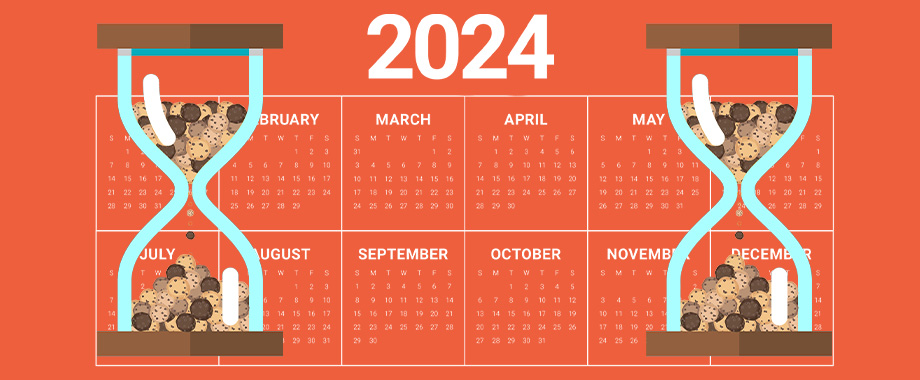Google Cookies: Everything You Need To Know About the Demise’s Recent Delay

If you’ve missed the news, Google delayed the cookie’s demise. Again. On July 27th, Anthony Chavez, the VP of Privacy Sandbox (the solution to replace Google cookies), said they intend to phase out third-party cookies by the second half of 2024. Initially, the phase-out was meant to happen by 2023.
It seems like Privacy Sandbox APIs are tough cookies for Google to crack. In the meantime, let’s explore what cookies are, why their removal has been delayed again, and what this delay can mean for e-commerce brands.
What Are Google Cookies, And Why Do They Need To Be Replaced?
Google cookies are small parcels of data used to identify your device. The identification is then sent to your network, which can track whichever sites you visit. With cookies, you can personalize the time you spend on a site.
Ever wondered how you see the same product you put in your shopping cart on every site you visit? Well, that’s cookies doing their fair share of work. There are two types of cookies: first-party and third-party. The main controversy is around third-party cookie privacy.
And that brings us to why Google is bidding them goodbye. Movement For An Open Web, a nonprofit organization focused on safeguarding the open internet, raised concerns about cookies to the Competition and Markets Authority (CMA). This resulted in an investigation by the Information Commissioner’s Office (ICO) and CMA in 2021. Google initially tried to resolve the case but then came up with an alternative solution: Privacy Sandbox. Both ICA and CMA have agreed to the proposal of Sandbox.
Originally, the project was geared to launch by 2022, and Google posted consistent timelines to update readers about its progress. Then they delayed it to 2023. And finally, on July 27th, 2022, they replaced the timeline to mid-2024.
Why Have They Been Pushed Again?
When the timeline for the cookie demise shifted to 2023, Vinay Goel, Privacy Director of Sandbox, posted a blog in which he said, “While there’s considerable progress with this initiative, it’s become clear that more time is needed across the ecosystem to get this right.”
He further stated that they needed to work at a responsible pace to ensure the technology is accessible to everyone now and in the future. He also cited other reasons, such as time to migrate to new services, avoiding the rise of covert approaches, and continuing engagement with regulators.
The latest blog, which informed the readers about the delay to 2024, was published by Anthony Chavez. Chavez stated they’d received consistent feedback to give more time to evaluate and test their Sandbox solution.
In his own words, “This feedback aligns with our commitment to the CMA to ensure that the Privacy Sandbox provides effective, privacy-preserving technologies and the industry has sufficient time to adopt these new solutions.”
To allow time for their developers to adopt these APIs, they’ve planned to phase out third-party cookies in Chrome by Q2 of 2024.

How Will This Move Affect E-Commerce Brands?
The removal of cookies will mainly affect e-commerce brands, and experts who interact daily with these companies have a lot to say on the topic.
Menachem Ani, the Founder of JXT Group, an agency that manages Google Ads for e-commerce brands, said, “While technology moving to a more privacy-centric place is great for consumers, we’re happy to see cookie depreciation get delayed, so ad platforms and advertisers have more time to adapt to the changing landscape. Ultimately, most of the internet is powered by advertising, and it’s in consumers’ best interests to be served relevant and timely ads.”
Akshay Makadia, a digital marketing consultant for e-commerce brands, said, “In a world without third-party cookies, eCommerce owners will need to search for creative ways that help them to identify users online, as nearly 80% of advertisers are dependent on third-party cookies. With the demise of third-party cookies, overall marketing will be affected by the following parameters — tracking, analysis, and personalization of ads.
To sustain new changes, eCommerce owners will need to shift the paradigm accordingly, so much so as focusing more on first-party cookies, contextual advertising, behavioral targeting, and sSocial media presence.”
Here’s a closer look into what this means:
First-party cookie
The host domain creates first-party cookies to provide a better user experience. First-party cookies enable the web browser to save vital details such as username, what products you added to your cart, and language preferences. With the help of first-party cookie and analytics data, shop owners can re-target the user and serve them relevant content when they revisit the website.
Contextual advertising
Without Google cookies, advertisers won’t have data that shows which specific user viewed what product. With minimal data, personalized dynamic ads, like retargeting ads, are going to be harder to automate. Contextual advertisements will help marketers increase sales by showing relevant items to visitors and turning them into customers.
Social media
Social media is here to stay. You can always upload a list of shoppers’ emails to social media and keep hammering away about the products they’ve viewed. This is a creative way to show them personalized ads without third-party cookies.
Akshay also suggested exploring channels you’d have more sovereignty over, such as SMS, emails, and push notifications.
What To Do When The Cookie Crumbles
Google cookies are about to crumble. Be it in 2023, 2024, or perhaps even later than that. Consumers much prefer their privacy over personalization.
If Sandbox can deliver a solution that creates personalized experiences without compromising on safety concerns, it would be a huge win-win for consumers and e-commerce brands. But there’s no saying how a product that’s seen so many shifts in its deadline will go.
If you plan to make your e-commerce brand thrive and wish to capture leads, with or without cookies, then we’ve got you covered. Explore what AdQuadrant can do for you.
About the author: Ashley R. Cummings is a professional freelance writer and content marketing consultant specializing in e-commerce, marketing, and SaaS. Connect with her on Twitter!




